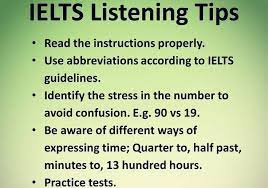The IELTS Listening test comes first, and many candidates find it a hard, sometime even discouraging, way to get started. The IELTS Listening task tests a diverse range of skills, and many people find it challenging.
There are many ways to prepare for this portion of the IELTS exam. There are, for example, many practice tapes and CD sets on the commercial market. While all of them are helpful to some degree, the one thing you can be sure is that none of them will be the IELTS Listening test you take.
The good news is that the best forms of IELTS Listening practice are available free, or at least readily and at low cost. They're also more fun. They are radio, TV, and movies!
If you have access to an English-language radio or TV station, listen to it as often as possible. The benefits are many.
- You become familiar with a wide variety of accents and individual ways of speaking
- You get the rhythms of spoken English sentences in your ear
- You become more familiar with the way native speakers pronounce English words
- You start to hear word patterns and notice the way English sentences are put together
- You begin to learn new vocabulary by hearing it in context
- You simply become accustomed to the sound of spoken English, which may be the single most important thing of all
English radio and TV talk shows give you good exposure to the way native speakers - not English teacher - actually use the language. They familiarize you with slang and other colloquialisms.
English radio and TV news programmes give you great background for the multiple-voice, nonacademic setting section of the IELTS Listening test, which often uses a mock radio broadcast. Hearing up to four different individuals talk about the same incident from different personal perspectives, in different acoustical situations, and in a variety of accents (including those of second-language speakers) is exactly the kind of training you need to perform well on this portion of the test, which some candidates find the hardest.
Watching English, Australian, American, and other movies in English - in any format - is also highly useful in giving you exposure to the way "real people" speak English. As with all languages, it's not the same as classroom English.
If you see such movies in the theatre, try to look at the subtitles as little as possible. If you watch them on DVD, watch them once with subtitles, so you learn the situations and dialogue - and then switch the subtitles off and watch them again and again, until you can understand what is being said without "translating." Many local cable-TV providers show movies many times over the same time period. If you have access a movie channel on such a service, get the schedule, watch the movies you want once with the subtitles - and then, on repeat viewings, tape over the bottom of your TV screen so you cannot use the subtitles.
What's important is that you expose yourself to the sound of spoken English as much as possible between now and the time you take IELTS. Use time that you otherwise might waste. When you're getting dressed or eating breakfast in the morning, have the radio or TV on, set to an English station. If you are doing tasks that don't require your full attention, like cooking or cleaning your room, have the radio or TV on in the background. If you spend a lot of time stuck in traffic, turn the car radio onto an English news or talk station.
Of course, you will benefit more the more you concentrate on what you hear. But even if you don't focus on what you hear only, trying to understand what is being said, simply letting the sounds into your ears will help. Educators are now convinced that there is such a thing as "passive listening." That means that you're often learning even when you're not trying to. If you have English on - even "in the background" - your brain is trying to figure out what is being said even if you're not concentrating on it.
Most important of all, the day you actually tale the IELTS exam, make sure that the first time you hear English that day is not when the tape for the Listening test starts. That may be too late, and you could miss a question or too while your ears "adjust" to the sound of English. Even if you're nervous and feel like you can't concentrate on it, have the radio or TV on while you're getting dressed, eating breakfast, or getting to the IELTS exam. You'll be glad you did.

